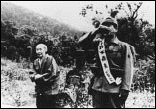--Furuyashikimura |
|
 |
Production Company: Ogawa Productions Director: Ogawa Shinsuke Producer: Fuseya Hiroo Photography: Tamura Masaki Location Sound: KIkuchi Nobuyuki Assistant Directors: Iizuka Toshio, Mikado Sadatoshi Sound: Asanuma Yukikazu Poem: Kimura Michio Music: Seki Ichiro Drawing: Fujimori Reiko Titles: Shoji Takashi Negative Editor: Takahashi Tatsuo 1982 / Color / 16mm / 210 min / English subtitles |
| Furuyashikimura: a hamlet of just eight houses in the Zao mountains close to Magino. When the cold weather of 1980 damaged their rice crop, Ogawa and his staff went to Furuyashiki to investigate the peculiar chill. In order to begin to investigate the causes of the damaging cold weather, they performed experiments that reproduced the flow of cold air on a three dimensional topographical model. Their scientific analysis extended as far as geological surveys and the use of microscopic photography to record the blooming of a rice flower, but gradually the focus of the film shifts to the history of crop damage due to cold weather in Furuyashiki. The old people also tell the filmmakers their personal histories, about the charcoal making that used to flourish, and the depopulation that the modernization of the single road connecting the hamlet to the town caused. The last charcoal maker and his mother remember the sons who died in the war and the family history that is wrapped up in the roadside gravestones. An old man speaks of journeying to the colony of Manchuria and of being repatriated, while other old soldiers who were stationed in New Guinea play the military bugle proudly. As they do so, history is brought back to life as if it were yesterday, and at some point the history of Furuyashiki during the Showa period broadens into a history of the modern Japanese State. This is the first film Ogawa completed in the 1980s after moving to Yamagata and is recognized as a masterpiece that stands out from the rest of his films. It won the FIPRESCI (film critics) prize at the Berlin International Film Festival and brought Ogawa recognition once again as a world class documentary filmmaker. |